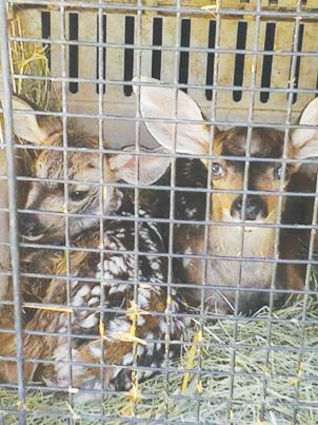It's that time of year again
Windswept Ranch
I walk the ranch every morning and every night just to check and make sure all is well with the critters. It is a peaceful time and I enjoy the quiet to just visit with my friends, the animals. This morning baby rabbits were scampering everywhere and it reminded me that it is that time of the year: The time when little ones are everywhere and I start getting phone calls, and this year is shaping up to be busier than usual based on the abundance of forage as a result of the rains.
At Windswept Ranch, this time of year we get calls about fawns from all over the Tehachapi area. I think that just shows how much Tehachapi residents care about their deer, so this seems a great time to remind everyone how to act when encountering deer.
First, and foremost, please remember that these animals are WILD! That cute spotted fawn is a very important part of California's eco-system. They are animals native to our region and have been here longer than any of us; and it is illegal to remove them from the wild.
If you are anything like me, you treasure seeing these animals in the wild, and realistically, that is where they belong.
But with that said, unforeseen circumstances sometimes force us to intervene. Here are some of the things you should know:
Do not assume that if you see a fawn alone it is orphaned or abandoned. Mother deer often leave their young alone, sometimes for 12 – 24 hours. She leaves her baby where she will know where to find it. You see, fawns have no scent, so they are basically invisible to predators when they are young. Fawns are not steady enough on their feet to travel with the herd until they are about 2 weeks old, so mom parks it and remembers the exact location. If you remove them, that poor mother will return for days, looking for her little one.
So if you see a fawn alone, please do not pick it up unless there is clearly a problem: If it is "meowing" constantly and no mama is coming, is next to a dead mom, or is obviously in distress with labored breathing, has signs of an injury, signs of dehydration or hypothermia, or signs of diarrhea. Instead, check on it over the next 12 hours. If you find it has moved, that means the mother has come back and moved it. A fawn will not wander from where the mother has left it. If the fawn is still there after a period of time, your best bet is to call a rehabber. We have no one licensed to do fawn rehabilitation in our area, so Windswept serves as a transport to licensed rehab facilities in Fresno, Malibu and Santa Ynez, while we work to get our license.
We get between 20 and 40 calls a year. The calls come from people who are monitoring a fawn and feel it is time for an intervention as well as from people who just "could not leave that poor baby out there all alone". They come from law enforcement and from Fish and Wildlife wardens. We do the best we can to help.
Sometimes, it is too late and we lose the baby. Sometimes there are happy endings and after months at a rehab center, we get to watch the animals released back into the wild.
There are times when the animals just cannot be released despite our best efforts: Case in point, Muffin.
Muffin came to the ranch a couple of years ago. She had been hit by a car on Woodford Tehachapi and a couple found her and took her in. It was late at night, but first thing the next morning, we got the call. Muffin was pretty badly beat up and needed veterinary care. She spent a night in the hospital being put back together and after that, we transported her to Malibu for rehabilitation. She spent six months in Malibu where rehabbers do an amazing job of keeping animals wild so they can be released.
But after six months, it was determined that she could not be released in the wild: Her injuries had healed but there was too much damage to her knee making it difficult for her to run as fast as the other deer; and so it was that Muffin came to Windswept where she will live out her life. Seeing her released into the wild would have been an amazing thing, but we love her and are happy to have her as part of the family. She has gone from wild to friendly and loves children.
Please remember, that cute little spotted critter will grow to be a big deer, and if habituated, could be dangerous. Deer belong in the wild, and we hope you will help us keep them there.
If you have a deer emergency, you may call Diana at (661) 809-3965.
If you would like to meet Muffin and her friends, the ranch is open for tours on Saturdays only from 10 to 4 p.m.
Directions: From Tehachapi take Highline Rd., East to Tehachapi Willow Springs Rd., turn right and go 11 miles to the "OPEN" banner and turn right up the dirt road.





